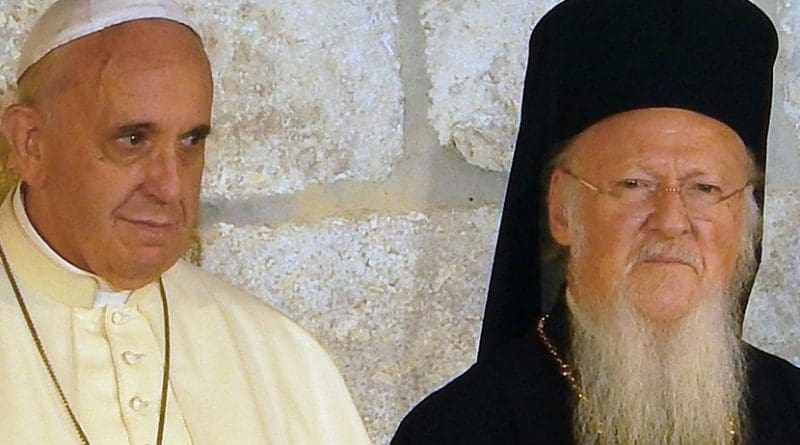Knowledge, Humility And Evangelical Witness – OpEd
By Rev. Gregory Jensen*
On September 1, Pope Francis and Ecumenical Patriarch Bartholomew issued a joint message for the “World Day of Prayer for Creation.” Their statement rightfully reminds us that we all have an “obligation to use the earth’s goods responsibly.” But exhortations by the pope and patriarch should not be read as a policy prescription.
Unlike theology, science speaks in probability. How the climate will change going forward and the role of human activity has in any such change can’t be answered with absolute certainty. In this case, we need to be careful of broad epistemological claims which necessarily raise questions about the limits of human knowledge.
Epistemological humility also keeps us from assuming that climate change is uniformly negative. Matt Ridley, the British journalist, argues not only that “the risk from global warming is being exaggerated,” but that we are also overlooking the positive effects of elevated atmospheric levels of carbon dioxide. For example, we are seeing a “gradual, but large, increase in green vegetation on the planet.” According to Ridley, this increased greening is “a direct result of rising carbon dioxide levels in the atmosphere, rather than the application of agricultural fertiliser, irrigation, warmer temperatures or increased rainfall.”
Ridley takes pains to say that he is not a “climate change denier.” He is instead skeptical of the idea that climate change is inherently dangerous. Will a greener planet be a better planet for human beings? Maybe, but for this to happen we need to shift from environmental science to anthropology.
Too frequently, and despite overwhelming evidence to the contrary, environmental debates assume human beings are incapable of adapting to change. This is more than a little ironic, since most environmentalists would argue that climate change is the result of increased industrialization. The climate is changing because human beings continue to change and adapt to our environment.
As our ability to change led to industrialization (and diminishing global levels of poverty and increased standards of living), it has, in turn, brought about technological developments and cultural shifts that diminish negative human impact on the environment. Water and air, for example, are dramatically cleaner now than when I was a boy.
Government regulations played a role. But these regulations reflected changes in human desires, technological advances, and the increased wealth. It isn’t enough to want a better life or a cleaner environment. We also need the means to bring this about. More people around the globe have these means at their disposal, because we can change.
Environmental regulations also raise the technical question of whether they will work. We can hope they work but there are always unforeseen events that can undo even the most well thought-out and researched regulations. They also raise moral questions that likewise don’t admit clear answers.
Regulations infringe on property rights. Such rights aren’t absolute. Civil law and the Christian moral tradition allow for exceptions. For the common good, government can deny an individual or community’s right to use or dispose of their property as they see fit. The caveat here is that the owner must be given just compensation (which raises a new series of questions).
Another moral question concerns the justice of asking the current generation to bear the cost of responding to climate change. Even at a relatively low rate of economic growth, future generations will be wealthier than we are today. This means that we are asking those who are (relatively) poor to pay for policies from which they will accrue no benefit.
Is it just to ask this generation to bear the costs associated with an increased regulatory burden and lower economic return to benefit those who will in the future be better off than we are currently? Ought we take money out of the pocket of today’s poor(er) person to subsidize the quality of life for tomorrow’s rich(er) person?
Whatever we do regarding the climate, there will be costs and (hopefully) benefits. While we might want to think otherwise, we are limited in our ability to predict outcomes and so costs and benefits.
This why, I think, Pope Francis and Patriarch Bartholomew are wise to remind us of the importance of prayer:
After all, we know that we labour in vain if the Lord is not by our side (cf. Ps 126-127), if prayer is not at the centre of our reflection and celebration. Indeed, an objective of our prayer is to change the way we perceive the world in order to change the way we relate to the world. The goal of our promise is to be courageous in embracing greater simplicity and solidarity in our lives.
Accepting epistemological humility as the core of any environmental action is more than simply a technical matter. It is the fruit of a deep repentance that comes only through faith in the Holy Trinity, Who is the Creator of all. Following the example offered by the pope and the patriarch, Christians’ participation in environmental debates must not be limited to technical and policy matters. It must also be evangelical.
About the author:
*The Rev. Gregory Jensen is a social scientist specializing in religion and personality theory. Currently he is the interim pastor of St Ignatius Orthodox Church in Madison, WI and Orthodox Chaplain at the University of Wisconsin-Madison. He blogs at Koinonia and the American Orthodox Institute. In 2013, he was a Lone Mountain Fellow with the Bozeman, Mont.-based Property and Environmental Research Center (PERC).
Source:
This article was published by the Acton Institute

